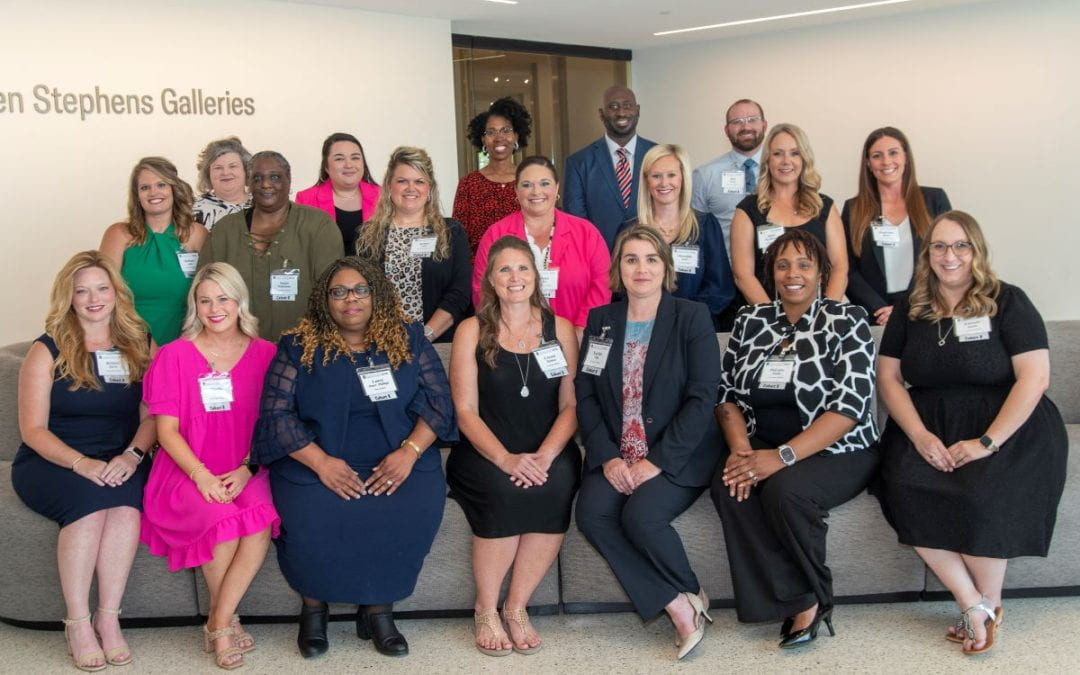The IMPACT Arkansas Principal Fellows program has helped build leadership capacity in high-needs, rural Arkansas schools for nearly a decade with the support of the Walton Family Foundation.
The U of A College of Education and Health Professions partnered with the foundation in 2014 to launch IMPACT, and their support has sustained the program since then. The college recently received new funding that will strengthen support to fellows. The Windgate Foundation pledged a nearly $500,000 gift to the college that’s earmarked for the next two cohorts of fellows. The Carl B. & Florence E. King Foundation also recently committed funds to the program. The $40,000 King Foundation gift will provide additional support to fellows from rural eastern Arkansas counties.
“IMPACT is making a huge difference in Arkansas by improving the available pool of potential leaders in schools that traditionally struggle to fill leadership positions,” said Dean Kate Mamiseishvili. “We are grateful for our partners that believe in the mission and have committed to helping support future school leaders.”
The 20 members of the newest cohort met for the first time last week to begin an intensive summer leadership institute. They spent time bonding as a cohort and taking the first steps of the 18-month program. These educators hail from 10 Arkansas school districts and 16 schools that are new to IMPACT. “Our footprint now includes more than half the high-poverty districts in the state,” said IMPACT Executive Director John Bacon.
He said the selection process for cohort eight was highly competitive. “We are excited to welcome this impressive group of future leaders for Arkansas schools serving high percentages of economically disadvantaged students,” Bacon said.
The College of Education and Health Professions hosted a reception at the Arkansas Museum of Fine Arts in Little Rock on June 16 to raise awareness about the program across the state and celebrate the 20 new members (see the fellows’ names and where they teach below). Alumni and school partners from previous IMPACT cohorts also attended the event and shared their personal success stories.
IMPACT’s eight cohorts include 147 fellows serving 122 schools in 81 school districts and eight charter systems.
“Hiring and supporting a highly qualified school leader is the single most important thing a school district can do to move the needle forward for school culture, student achievement, the desirability of the workplace and building more positive relationships with the community,” said John Pijanowski, the original creator of the program and principal investigator at the U of A.
These Arkansas educators will benefit from the robust support that makes IMPACT such a success story. Learning doesn’t end after the 18-month program wraps up. Mentorship and development extend into the early years of a fellow’s new leadership position. Fellows also join an active group of alumni who give back to the program and serve as a professional learning network for one another.
Graduates commit to staying in their current school for two years post-graduation after earning a master’s degree in educational leadership from the U of A. Nearly 100% of IMPACT graduates remain in Arkansas schools, and 81% remain in high-poverty schools.
Twenty-one educators from cohort seven will graduate from the “grow your own” leadership preparation program in December and will influence an estimated 800 teachers and 8,000 students across Arkansas.
Paula Thiel, a third-grade teacher at Booneville Elementary School in south Logan County, is a fellow in the newest cohort. She’s a proud alumna of Booneville High School, class of 2012. “As an adult, I am now honored to be able to serve the community that helped raise me,” she said.
She’s excited about the opportunity to grow as a leader through IMPACT — for her students and her hometown.
Thiel recalled her interview with an IMPACT panel as part of the rigorous selection process. “The smiles, warmth, acceptance, personal experiences and knowledge shared in those conversations flipped a switch for me,” she said. “I was no longer nervous, but instead, I was excited about the possibility of working and learning alongside these individuals to help mold me into a leader of the future. Their ideas and enthusiasm for education surpassed what I had been hoping for.”
Thiel felt confident she would receive extensive guidance and support while earning her Educational Leadership master’s degree. “Being chosen to be a part of cohort eight is a journey that I am proud to be on,” she said. “I can’t wait to see the leader that I am on the other side.”
The following educators were chosen for cohort 8:
- Brittany Aalto, Lincoln Elementary School, Lincoln School District
- Stephanie Baker, Greenland Middle School, Greenland School District
- Erica Box, McGehee Elementary, McGehee School District
- James Copeland, Marvell-Elaine High School, Marvell-Elaine School District
- Britney Davis, Cedar Ridge Elementary School, Cedar Ridge School District
- Kaylan Ellis, Berryville Elementary, Berryville School District
- Jessica Gray, Paris High School, Paris School District
- Meredith Jeter, Park Avenue Elementary, Stuttgart School District
- Ben Jones, Pangburn High School, Pangburn School District
- DaLecia Jones, Robert F. Morehead Middle School, Pine Bluff School District
- Marlie Kinard, Douglas MacArthur Junior High, Jonesboro School District
- Cassie King, Clarendon High School, Clarendon School District
- Sonja McKinney, Lee High School, Lee County School District
- Laura Starr Phillips, J.F. Wahl Elementary, Helena-West Helena School District
- Patricia Smith, Bismarck Middle School, Bismarck School District
- Keri Standridge, Leslie Intermediate School, Searcy County School District
- Paula Thiel, Booneville Elementary School, Booneville School District
- Crystal Thomas, Arkansas Middle School, Texarkana School District
- Tamra Wiley, Brady Elementary School, Little Rock School District


